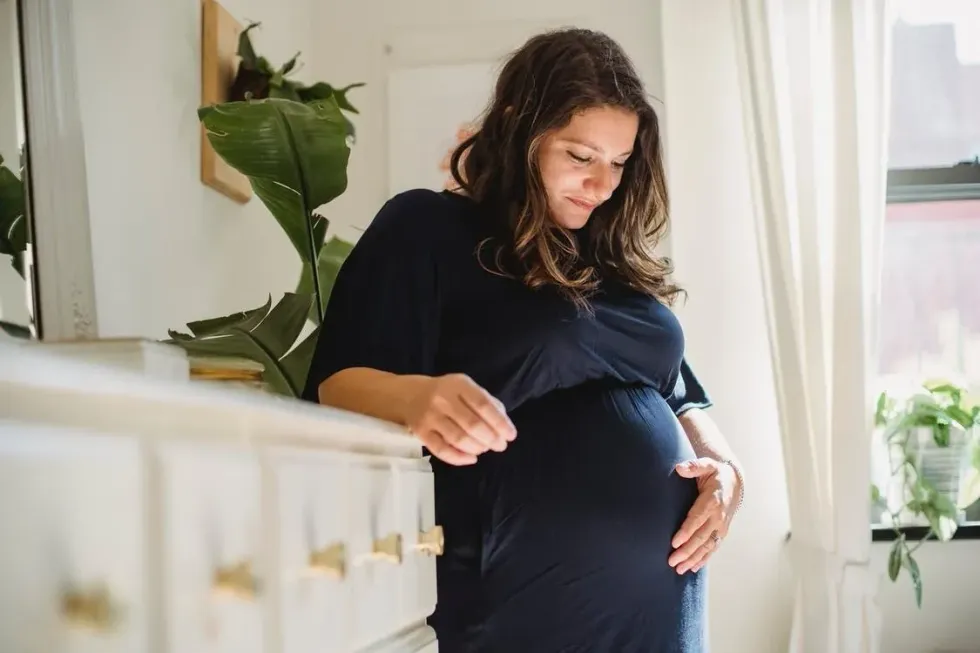For a lot of women, morning sickness is a bit of a rite of passage in the first trimester of pregnancy.
Nausea and vomiting are never welcome, but when it's all anyone talks about, what happens if it gets to week eight of your pregnancy and you still aren't experiencing it at all? Is it normal not to experience morning sickness?
You might be feeling tempted to worry that something's gone wrong if you have no morning sickness in early pregnancy, but in reality, there are many different factors that mean women might not feel any signs, and most of them are nothing to worry about!
Take a look at our most common reasons why you might experience no morning sickness while pregnant, and you're probably going to end up feeling a bit like you've cheated the system.
You can also check out these two articles if you're experiencing anxiety in early pregnancy, or if you are wondering if pregnant women can drink wine.
When Does Morning Sickness Usually Occur?
Morning sickness usually occurs at some point in the first trimester of pregnancy, but nausea and vomiting could start at any point in the first four months of pregnancy and is completely normal.
Usually, pregnant women will have some symptoms of morning sickness around two weeks after their first missed period (which is about six weeks into the pregnancy), but it's also completely common to experience no morning sickness during pregnancy until a bit later, and then to wake up feeling queasy overnight.
Equally, you might find that nausea and vomiting start gradually and get worse over a few days or weeks.
Morning sickness can also range from a touch of nausea or a bit of an aversion to certain foods to pretty much constant nausea and vomiting. The term 'morning' unfortunately is used pretty loosely, if you're unlucky it can strike at any point in the day.
What Does A Lack Of Morning Sickness Mean?

Let's get one thing straight: there is no such thing as a 'normal' pregnancy. Pregnancy symptoms massively vary from one pregnant woman to the next, so what you are going through is probably going to be totally different from what other pregnant women experience.
Between 70-80% of women experience some form of morning sickness and vomiting during pregnancy, which means that between 20-30% are lucky enough not to have any form of it at all.
So while it seems like everyone else is complaining about their stomach, you might want to count yourself lucky (and maybe keep it quiet among your other pregnant friends).
Another thing to note about morning sickness is that just because you've experienced it before does not mean that you'll have those symptoms again with your next pregnancy.
Pregnancy symptoms can be completely different every time, and even though you might feel totally weird because the first trimester is not what you're expecting, most of the time everything is normal.
There are a few different medically reviewed theories about why some women feel the effects of morning sickness. It's been suggested that women might experience the symptoms as an evolutionary trick to make sure they pay attention to their health and diet and eat better food to help the baby grow.
Another theory suggests that morning sickness helps women to avoid toxic substances that might pose a medical risk to the health of the baby.
A woman who doesn't experience any symptoms of morning sickness might just have a body that is well equipped to handle the higher than normal hormone levels of human chorionic gonadotropin (hCG) and estrogen and all those other hormones that make you feel nausea in the early stages of pregnancy.
There is an urban myth that you're more likely not to experience morning sickness if you're pregnant with a boy, because of the lack of hormones in your body.
The science behind it is limited and we don't think it's been medically reviewed just yet, so we'll leave it up to you to make up your mind about that one, but there are studies being done at present to work out if that's actually the case.
If you have no morning sickness with twins, that can be totally normal too, even though research shows that women who are pregnant with twins do tend to have worse morning sickness and aversion to foods due to their increased level of hormones.
In western society, around a third of women report some kind of morning sickness during pregnancy, but in some societies, it is barely documented at all.
Some theories suggest that a plant-based diet of whole foods might be the reason for lower rates of morning sickness and better health during pregnancy in some cultures, but there haven't been many studies done to prove or disprove this theory.
Some medically reviewed studies have also shown that hormone levels and morning sickness can be hereditary (thanks, mom), so pregnant women may want to ask their mothers about their experiences, and sometimes that can give you a good idea of what the early months of pregnancy might look like for you.
And before you start feeling too smug about having no morning sickness at seven or eight weeks, or even 14 weeks, hold your horses. Although most pregnant women are normally hit by nausea before the first 14 weeks, other women can feel the effects much later on.
Should I Be Worried?

Most of the time, having no morning sickness doesn't indicate that anything is wrong with your baby at all. It is totally natural to worry when things aren't going the way you expect during your pregnancy though, and it's a good idea to see a medical professional if you're feeling anxious during your early pregnancy.
There are a few theories about the connection between morning sickness and having a miscarriage.
In 2016, medical research found that people who had previously experienced a miscarriage were around 50-75% less likely to have another miscarriage if they did have some kind of nausea or morning sickness.
Other research has shown that if you suffer from nausea and morning sickness, this could indicate that you are likely to suffer a miscarriage, but again, this doesn't mean that there's any risk to your baby just because you aren't feeling sick.
There are many healthy pregnancies that experience no morning sickness at all, so try not to worry too much if this is the case. As always, it's good to highlight to your doctor if you feel like something isn't right, if only for their reassurance more than anything.
If you do experience morning sickness in the early stages of pregnancy and then suddenly all the signs of your pregnancy go away and you no longer feel sick, then it's important to see your doctor because this could be a sign of miscarriage, and it's important to check on the health of your baby.
If you found this article helpful, then why not take a look at the effects of licorice root in pregnancy or what to do if you get morning sickness at night?










